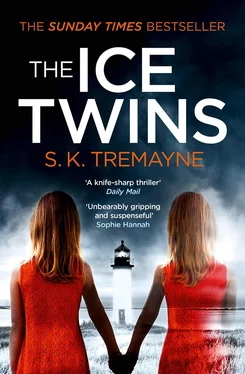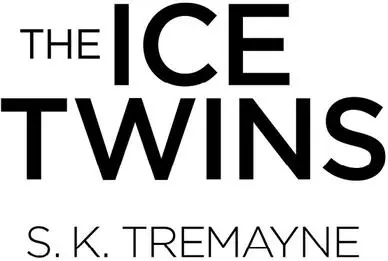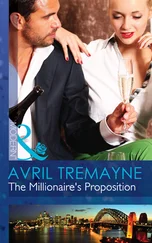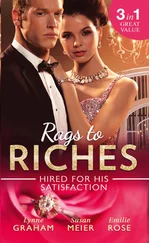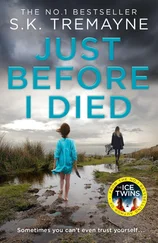
Published by HarperCollins Publishers
1 London Bridge Street
London SE1 9GF
www.harpercollins.co.uk
First published by HarperCollins Publishers 2015
Copyright © S. K. Tremayne 2015
Photographs © S. K. Tremayne
Cover layout design © HarperCollins Publishers 2015
Cover photographs © Alan Clarke / Archangel Images (girls), Shutterstock.com(all other images)
S. K. Tremayne asserts the moral right to be identified as the author of this work
A catalogue record for this book is available from the British Library
This novel is entirely a work of fiction. The names, characters and incidents portrayed in it are the work of the author’s imagination. Any resemblance to actual persons, living or dead, events or localities is entirely coincidental.
All rights reserved under International and Pan-American Copyright Conventions. By payment of the required fees, you have been granted the non-exclusive, non-transferable right to access and read the text of this e-book on-screen. No part of this text may be reproduced, transmitted, down-loaded, decompiled, reverse engineered, or stored in or introduced into any information storage and retrieval system, in any form or by any means, whether electronic or mechanical, now known or hereinafter invented, without the express written permission of HarperCollins e-books
Source ISBN: 9780007563036
Ebook Edition © JANUARY 2015 ISBN: 9780007459247
Version: 2017-10-18
For my daughters
Table of Contents
Cover
Title Page
Copyright
Dedication
Author’s Note
Chapter 1
Chapter 2
Chapter 3
Chapter 4
Chapter 5
Chapter 6
Chapter 7
Chapter 8
Chapter 9
Chapter 10
Chapter 11
Chapter 12
Chapter 13
Chapter 14
Chapter 15
Chapter 16
Chapter 17
Chapter 18
Chapter 19
Chapter 20
Chapter 21
Chapter 22
Chapter 23
Chapter 24
Chapter 25
Chapter 26
Chapter 27
Six Months Later
Chapter 28
Keep Reading
About the Author
About the Publisher
I would like to thank Joel Franklyn and Dede MacGillivray, Gus MacLean, Ben Timberlake, and, in particular, Angel Sedgwick, for their help with my research for this book.
Anyone who knows the Inner Hebrides will quickly notice the very strong resemblance between ‘Eilean Torran’ and the real Eilean Sionnach, off Isleornsay, in Skye. This is no coincidence: the book was inspired, in part, by a lifetime of visiting that beautiful tidal island, and staying in the whitewashed cottage under the lighthouse.
However, all the events and characters described herein are entirely fictional.
Editorially, I want to thank Jane Johnson, Helen Atsma, Kate Stephenson and Eugenie Furniss: without their encouragement, and wise advice, this book would not exist.
Finally, I owe a debt of gratitude to Hywel Davies and Elizabeth Doherty, for sowing the original seed, which grew into an idea: twins.
Our chairs are placed precisely two yards apart. And they are both facing the big desk, as if we are a couple having marital therapy; a feeling I know too well. Dominating the room is a pair of lofty, uncurtained, eighteenth-century sash windows: twin portraits of a dark and dimming London sky.
‘Can we get some light?’ asks my husband, and the young solicitor, Andrew Walker, looks up from his papers, with maybe a tinge of irritation.
‘Of course,’ he says. ‘My apologies.’ He leans to a switch behind him, and two tall standing lamps flood the room with a generous yellow light, and those impressive windows go black.
Now I can see my reflection in the glazing: poised, passive, my knees together. Who is this woman?
She is not what I used to be. Her eyes are as blue as ever, yet sadder. Her face is slightly round, and pale, and thinner than it was. She is still blonde and tolerably pretty – but also faded, and dwindled; a thirty-three-year-old woman, with all the girlishness long gone.
And her clothes?
Jeans that were fashionable a year ago. Boots that were fashionable a year ago. Lilac cashmere jumper, quite nice, but worn: with that bobbling you get, from one too many washes. I wince at my mirrored self. I should have come smarter. But why should I have come smarter? We’re just meeting a lawyer. And changing our lives completely.
Traffic murmurs outside, like the deep but disturbed breathing of a dreaming partner. I wonder if I’m going to miss London traffic, the constant reassuring white noise: like those apps for your phone that help you sleep – by mimicking the ceaseless rushing sounds of blood in the womb, the mother’s heartbeat throbbing in the distance.
My twins would have heard that noise, when they were rubbing noses inside me. I remember seeing them on the second sonogram. They looked like two heraldic symbols on a coat of arms, identical and opposed. The unicorn and the unicorn.
Testator. Executor. Legitim. Probate …
Andrew Walker is addressing us as if we are a lecture room, and he is a professor who is mildly disappointed with his students.
Bequeathed. Deceased. Inheritor. Surviving Children.
My husband Angus sighs, with suppressed impatience; I know that sigh. He is bored, probably irritated. And I understand this; but I also have sympathy for the solicitor. This can’t be easy for Walker. Facing an angry, belligerent father, and a still-grieving mother, while sorting a problematic bequest: we must be tricky. So his careful, slow, precise enunciation is maybe his way of distancing, of handling difficult material. Maybe it is the legal equivalent of medical terminology. Duodenal hematomas and serosal avulsions, leading to fatal infantile peritonitis .
A sharp voice cuts across.
‘We’ve been through all of this.’
Has Angus had a drink? His tone skirts the vicinity of anger. Angus has been angry since it happened. And he has been drinking a lot, too. But he sounds quite lucid today, and is, presumably, sober.
‘We’d like to get this done before climate change really kicks in. You know?’
‘Mr Moorcroft, as I have already said, Peter Kenwood is on holiday. We can wait for him to come back if you prefer—’
Angus shakes his head. ‘No. We want to get it done now.’
‘Then I have to go through the documents again, and the pertinent issues – for my own satisfaction. Moreover, Peter feels … well …’
I watch. The solicitor hesitates, and his next words are tighter, and even more carefully phrased:
‘As you are aware, Mr Moorcroft, Peter considers himself a long-standing family friend. Not just a legal advisor. He knows the circumstances. He knew the late Mrs Carnan, your grandmother, very well. He therefore asked me to make sure, once again, that you both know exactly what you are getting into.’
‘We know what we are doing.’
‘The island is, as you are aware, barely habitable.’ Andrew Walker shrugs, uncomfortably – as if this dilapidation is somehow his company’s fault, but he is keen to avoid a potential lawsuit. ‘The lighthouse-keeper’s cottage has, I am afraid, been left to the elements, no one has been there in years. But it is listed, so you can’t completely demolish and start again.’
Читать дальше
